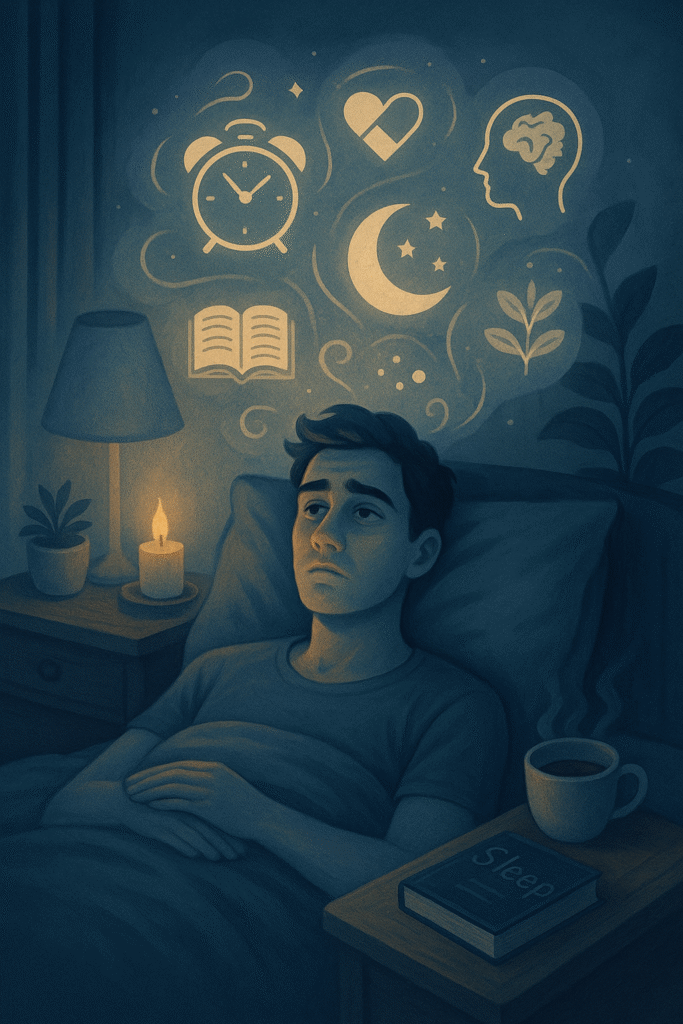You’re exhausted. You’ve been running all day. You want to sleep—but your brain’s on overdrive and your body won’t settle. Sound familiar?
We often blame stress, screens, or just “bad sleep,” but many times the culprit is hidden in our evening habits. Let’s uncover what’s silently sabotaging your rest and how to fix it.
1. Doomscrolling Before Bed
The Blue Light Trap
Endless scrolling under the covers may feel like winding down, but it actually fires up your brain. Blue light from your phone tricks your brain into thinking it’s still daytime, suppressing melatonin—the hormone that signals sleep.
Mental Stimulation & Anxiety
Besides the light, the content itself—news, social media drama, or even exciting reels—triggers cortisol and anxiety. The result? A wired mind that resists sleep.
Tip: Switch to airplane mode an hour before bed and try reading something calming.
2. Late-Night Snacking
How Digestive Activity Disrupts Deep Sleep
Your gut needs downtime too. Eating late revs up your digestion when your body wants to slow down. It also increases the chances of indigestion and acid reflux.
Foods That Sneakily Keep You Awake
Chocolate (hello caffeine), spicy foods, and sugary treats are big offenders. Even “healthy” snacks can spike blood sugar and delay sleep.
Tip: If you must snack, stick to a banana or a few almonds—sleep-friendly and magnesium-rich.
3. Overthinking the Day
Cognitive Load and the Racing Mind
Replaying conversations, planning tomorrow, or spiraling into “what ifs”? This mental chaos elevates cortisol, making it harder to drift off.
Simple Techniques to Wind Down
Try brain-dumping in a journal. Or practice 4-7-8 breathing: inhale for 4 seconds, hold for 7, exhale for 8. This pattern signals your nervous system to relax.
4. Drinking Alcohol to “Relax”
The False Sleep Aid
It might knock you out faster, but alcohol messes with your sleep cycle—especially REM sleep, the phase crucial for memory and recovery.
How Alcohol Sabotages REM Sleep
It fragments your sleep, leads to early awakenings, and worsens snoring or sleep apnea.
Tip: Swap that glass of wine for a calming herbal tea like chamomile or lemon balm.
5. Skipping a Consistent Wind-Down Routine
The Importance of Sleep Signals
Our brains thrive on cues. If your routine is all over the place, your brain doesn’t know when it’s time to sleep.
Examples of a Calming Routine
- Dim lights after sunset
- Warm shower
- Reading (paper, not screen!)
- Light stretches or meditation
Even just 20 minutes of this can train your brain like clockwork.
6. Intense Evening Workouts
How Late Training Spikes Cortisol
Exercise is fantastic—but not too close to bedtime. It raises body temperature and adrenaline, which are the opposite of what you need for sleep.
When & How to Work Out for Better Sleep
Aim for morning or afternoon workouts. If evenings are your only time, opt for yoga or a slow walk instead of high-intensity sessions.
7. Magnesium Deficiency
Why Magnesium Is Crucial for Sleep
Magnesium helps your body relax by regulating GABA (a calming neurotransmitter). Low levels can lead to restlessness, anxiety, and even insomnia.
Natural Ways to Get Magnesium
Dark leafy greens, almonds, pumpkin seeds, avocados, and bananas are all great sources. Some people also benefit from a high-quality magnesium supplement before bed (talk to your doctor first).
💡 Many people don’t realize how life-changing getting enough magnesium can be for sleep. We’ll talk more about this in future posts (and ads), but just know—it’s a foundational part of a good sleep routine.
How to Build a Better Nighttime Routine
Creating a Calm Evening Environment
- Keep lighting warm and low
- Use blackout curtains
- Reduce clutter in your bedroom
- Keep your room slightly cool (around 65°F)
Devices, Lighting, and Temperature Hacks
Use blue light filters on your screens, try amber glasses, or better yet—ditch devices altogether in the last hour.
The Role of Lifestyle & Diet in Sleep Quality
Your sleep isn’t just about what happens at night. What you eat, how you move, your stress levels, and even your mindset—all play a role.
Start by being intentional with your evenings. Small changes compound into deeper, more restorative rest.
Final Thoughts: Small Changes, Big Impact
Sleep isn’t a luxury—it’s a biological necessity. Yet so many of us unintentionally sabotage it with habits that feel “normal.”
The good news? You don’t have to overhaul everything. Begin with one small change—whether it’s putting down your phone earlier or adding more magnesium-rich foods to your plate—and build from there.
Your brain, body, and energy levels will thank you.
📚 Resources & References
- Sleep Foundation – Effects of Blue Light
- Cleveland Clinic – Sleep and Alcohol
- NIH – Magnesium and Sleep Regulation
- Harvard Health – Why Your Brain Won’t Shut Off
- CDC – Sleep Hygiene Tips
FAQs
1. What time should I stop using screens at night?
Ideally, power down all screens at least 60–90 minutes before bed to let melatonin production ramp up.
2. Can a hot shower help with sleep?
Yes! A warm shower or bath 1–2 hours before bed helps lower core body temperature—an essential cue for sleep.
3. Is it bad to fall asleep watching TV?
It depends, but the light and sound may disrupt your sleep cycles. Using a timer or blue-light filter can help if you need background noise.
4. Are sleep supplements safe to use every night?
Some are, but always consult a healthcare provider. Natural options like magnesium tend to be safer for regular use.
5. What role does magnesium play in sleep?
Magnesium calms the nervous system and helps the brain produce GABA, which is essential for deep, restful sleep.
“Want to learn more about Ways to Sleep Better Tonight ? Read our article on “Unwind Your Mind: 5 Natural Ways to Sleep Better Tonight”.
!”



Pingback: Sleep Better: The 7 Powerful Ways Magnesium Works Its Magic - Vitallity Health Hub
Pingback: Magnesium vs. Melatonin: Which One Helps You Sleep Better? - Vitallity Health Hub